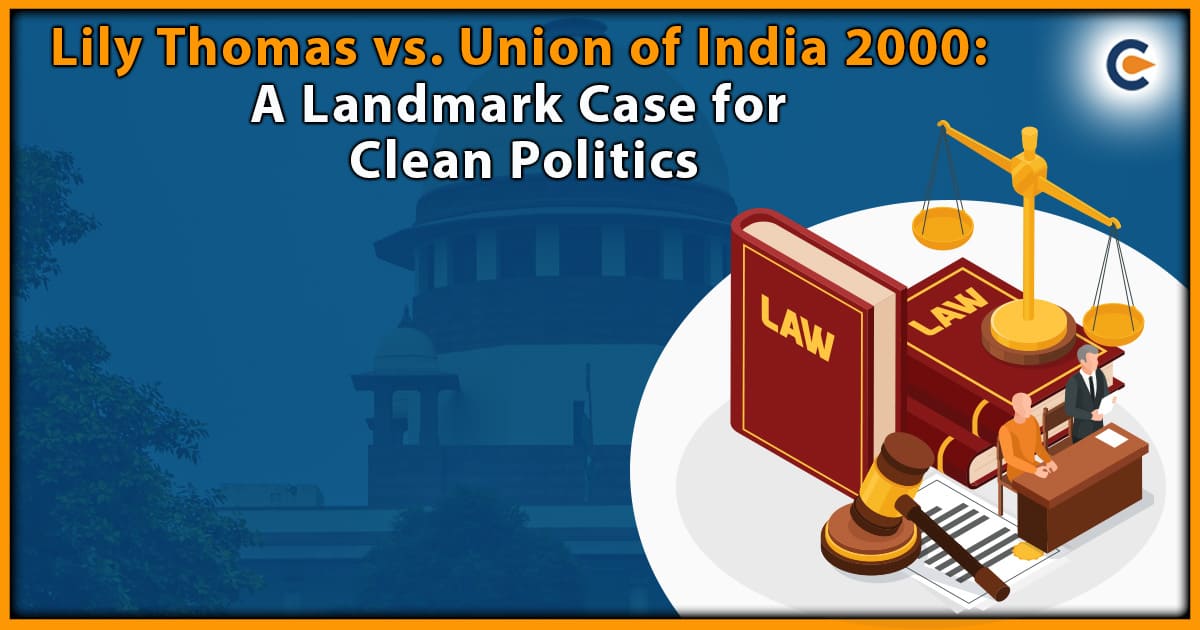India has been plagued by the problem of criminalization of politics for many years. In a country where elections are often influenced by money, muscle power, and criminal elements, it is not surprising that many politicians have criminal records. However, the situation was made worse by a provision in the Representation of the People Act, 1951, which allowed convicted lawmakers to continue holding their seats in the Parliament or State Legislature, provided they filed an appeal within three months of their conviction. This provision was struck down by the Supreme Court of India in the landmark case of Lily Thomas vs. Union of India in 2000.
Lily Thomas, a lawyer and social activist, filed a writ petition in the Supreme Court challenging the constitutionality of Section 8(4) of the Representation of the People Act, 1951. She argued that the provision violated the principles of equality before the law and the rule of law, and was against the spirit of the Constitution. She also contended that the provision encouraged criminalization of politics and allowed convicted lawmakers to continue holding public office, which was detrimental to the interests of the country.
The Supreme Court heard the case and in a historic judgment, struck down Section 8(4) of the Act as unconstitutional. The Court held that the right to vote and contest elections was not a fundamental right, but a statutory right that could be regulated by the Parliament. However, the Court also held that the Parliament could not create a class of convicted lawmakers who were exempt from disqualification from holding their seats.
The Court also noted that the Constitution provided for the separation of powers between the legislature, executive, and judiciary, and that the judiciary had the power to interpret the Constitution and strike down laws that were unconstitutional. The Court held that Section 8(4) violated the basic structure of the Constitution and was therefore invalid.
The judgment in Lily Thomas vs. Union of India was a significant step towards cleaning up the Indian political system and reducing the influence of criminal elements in politics. The judgment made it clear that convicted lawmakers would no longer be able to hold their seats in the Parliament or State Legislature, and that the rule of law would prevail over political expediency. It also sent a strong message to politicians that they could no longer get away with criminal activities and still hold public office.
The judgment was widely welcomed by the people of India, who had long been frustrated with the corruption and criminalization of politics in the country. The judgment was also hailed by civil society organizations, which had been fighting for clean politics for many years. The judgment paved the way for more transparency and accountability in the Indian political system, and helped restore the people’s faith in democracy.
Background of the case
The case of Lily Thomas vs. Union of India, also known as the Lily Thomas case, was a landmark judgment by the Supreme Court of India in 2013, which dealt with the issue of whether convicted lawmakers could continue to hold their seats in the Parliament or State Legislature.
The case had its origins in a public interest litigation filed by Lily Thomas, a social activist and former member of the Delhi Legislative Assembly. The petition challenged the constitutional validity of Section 8(4) of the Representation of the People Act, 1951[1], which allowed convicted lawmakers to hold their seats in the Parliament or State Legislature, provided they filed an appeal within three months of their conviction.
The petitioner argued that allowing convicted lawmakers to continue holding their seats was against the principles of equality before the law and the rule of law. She contended that it was unfair to allow convicted lawmakers to continue holding public office while denying ordinary citizens the same privilege.
Justices A.K. Patnaik, S.J. Mukhopadhaya, and Ranjan Gogoi made up the three-judge Supreme Court bench that heard the case. The Court heard arguments from both sides and examined the constitutional validity of Lily Thomas vs. Union of India 2000: A Landmark Case for Clean Politics.
The Court ultimately held that Section 8(4) of the Act was unconstitutional and violated the basic structure of the Constitution. The Court held that the right to contest elections was not a fundamental right, but a statutory right that could be regulated by Parliament. However, the Court also held that the Parliament could not create a class of convicted lawmakers who were exempt from disqualification from holding their seats.
The Court’s decision was widely hailed as a victory for democracy and the rule of law. It was seen as a major blow to the culture of corruption and the criminalization of politics in India. The judgment ensured that elected representatives of the people would have to maintain a clean criminal record and upheld the principle of equality before the law for all citizens.
Facts of the case
The case of Lily Thomas v. Union of India involved the interpretation of Section 8(4) of the Representation of the People Act, 1951, which allowed convicted lawmakers to continue holding their seats in the Parliament or State Legislature, provided they filed an appeal within three months of their conviction. Here are some of the key facts in the case:
- Social activist and former member of the Delhi Legislative Assembly Lily Thomas filed the case. She challenged the constitutional validity of Section 8(4) of the Act, which allowed convicted lawmakers to hold their seats in the Parliament or State Legislature, provided they filed an appeal within three months of their conviction.
- The petitioner argued that the provision was discriminatory and violated the principles of equality before the law and the rule of law. She contended that it was unfair to allow convicted lawmakers to continue holding public office while denying ordinary citizens the same privilege.
- Justices A.K. Patnaik, S.J. Mukhopadhaya, and Ranjan Gogoi made up a three-judge bench of the Supreme Court of India that heard the case. The Court examined the constitutional validity of Section 8(4) of the Act and heard arguments from both sides.
- The Court ultimately held that Section 8(4) of the Act was unconstitutional and violated the basic structure of the Constitution. The Court held that the right to contest elections was not a fundamental right, but a statutory right that could be regulated by Parliament. However, the Court also held that the Parliament could not create a class of convicted lawmakers who were exempt from disqualification from holding their seats.
- The Court observed that allowing convicted lawmakers to hold their seats would send the wrong message to society and undermine the rule of law. The Court also noted that the public had a right to expect a certain level of probity and morality from their elected representatives.
- The Court’s decision had far-reaching implications for the Indian political system, as it ensured that elected representatives of the people would have to maintain a clean criminal record. It was seen as a major blow to the culture of corruption and the criminalization of politics in India.
Issues of the case
The case of Lily Thomas vs. Union of India involved several important issues related to the Indian Constitution and the electoral process. Here are some of the key issues that were addressed in the case:
- Constitutionality of Section 8(4) of the Representation of the People Act, 1951: The central issue in the case was whether Section 8(4) of the Act, which allowed convicted lawmakers to hold their seats in the Parliament or State Legislature, provided they filed an appeal within three months of their conviction, was constitutional. The petitioner argued that the provision violated the principles of equality before law and the rule of law, while the respondents contended that it was necessary to protect the rights of lawmakers to contest elections.
- Right to contest elections: Another issue addressed in the case was whether the right to contest elections was a fundamental right under the Indian Constitution. The Court held that it was not a fundamental right, but a statutory right that could be regulated by the Parliament.
- Separation of powers: The case also raised questions about the separation of powers between the judiciary and the legislature. The Court had to balance the power of the Parliament to regulate the electoral process with its own duty to uphold the Constitution and protect the rights of citizens.
- Clean criminal record of elected representatives: The Court’s decision also had implications for the standards of probity and morality that were expected of elected representatives. The Court observed that the public had a right to expect a certain level of integrity from their elected representatives and that allowing convicted lawmakers to hold their seats would send the wrong message to society.
Overall, the case of Lily Thomas vs. Union of India raised important questions about the nature of democracy and the rule of law in India and had far-reaching implications for the political system in the country.
Judgment of case
In its judgment on the case of Lily Thomas vs. Union of India, delivered on July 10, 2013, the Supreme Court of India declared Section 8(4) of the Representation of the People Act, 1951 unconstitutional. The Court held that allowing convicted lawmakers to hold their seats in Parliament or State Legislature would be in violation of the Constitution and the principles of equality before law and the rule of law.
The Court held that the right to contest elections was not a fundamental right but a statutory right that could be regulated by the Parliament. However, the Court also observed that the Parliament could not create a class of convicted lawmakers who were exempt from disqualification from holding their seats. The Court noted that the public had a right to expect a certain level of probity and morality from their elected representatives and that allowing convicted lawmakers to hold their seats would send the wrong message to society and undermine the rule of law.
The Court held that Section 8(4) of the Act was unconstitutional and struck it down. The Court also directed that the disqualification of convicted lawmakers would continue to operate during the pendency of any appeal against their conviction.
The Court’s judgment had far-reaching implications for the Indian political system, as it ensured that elected representatives of the people would have to maintain a clean criminal record. The judgment was seen as a major blow to the culture of corruption and criminalization of politics in India and was widely hailed as a landmark decision in the country’s history.
Conclusion
In conclusion, the judgment in Lily Thomas vs. Union of India was a landmark moment in the history of Indian democracy. It was a significant step towards cleaning up the Indian political system and reducing the influence of criminal elements in politics. The judgment demonstrated the power of the judiciary to uphold the principles of equality before the law and the rule of law, and sent a strong message to politicians that they could no longer get away with criminal activities and still hold public office. It remains a shining example of how the Constitution can be used to protect the interests of the people and uphold the values of democracy.
Read Our Article: Can A Caveat Be Filed In A Writ Petition?











